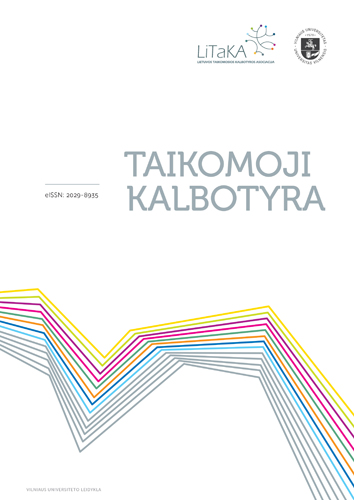Netikrų žodžių kartojimo testas: lietuvių vienakalbių ir dvikalbių vaikų kalbos tyrimas
Non-word repetition test: research into Lithuanian monolingual and Lithuanian-English bilingual children
Author(s): Eglė Krivickaitė-LeišienėSubject(s): Language acquisition, Psycholinguistics
Published by: Vilniaus Universiteto Leidykla
Keywords: psycholinguistics; bilingualism; language acquisition; input; non-word repetition test; phonology; syllable structure;
Summary/Abstract: The majority of studies comparing the language development of monolingual and bilingual children have found that bilinguals’ lexicon in each language is smaller than that of a comparable monolingual age-peers (Pearson et al. 1997; Werker et. al. 2009). Some studies have found that same-ages bilingual and monolingual children have relatively equal sized vocabularies when the vocabularies of both languages is taken into account (Bialystok 2001; Werker et al. 2009). The purpose of this study is twofold: 1) to introduce the Lithuanian non-word repetition test; 2) to present the results of a test, when monolingual (Lithuanian) and bilingual (L1 – Lithuanian, L2 – English) children had to produce Lithuanian non-words. The main focus of the study was to investigate the performance of monolinguals and bilinguals during the test in reference to word length and word complexity, namely consonant clusters.The test results with monolingual and bilingual children have shown that the length of the word is a very important indicator: repetition accuracy was found to decline with the increasing number of syllables in both monolingual and bilingual groups. The results of the complexity demonstrated that both groups were better when performing initial clusters rather than medial clusters, especially in longer words (mostly 4-syllable). The study has shown that the test results improve with age: older monolingual and bilingual children repeat non-words more accurately than younger children.The overall Lithuanian non-word repetition test results show that bilinguals repeat non-words less accurately than monolinguals. In the future, more children should participate in the non-word repetition test.
Journal: Taikomoji kalbotyra
- Issue Year: 2014
- Issue No: 4
- Page Range: 1-22
- Page Count: 22
- Language: Lithuanian

